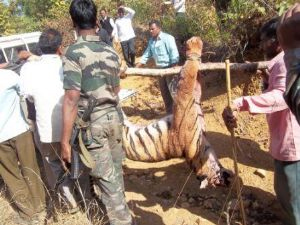 Nagpur, Jan 13: A man-eating tigress was shot dead by a sharpshooter of the C-60 anti-Naxal squad in Navegaon National Park in Maharashtra on Saturday, 27 days after it first killed a woman in Bhandara district. Gondia district deputy conservator of forests S V Ramarao said the animal was not more than three years old and was shot 20km from the Navegaon National Park boundary. The park is 130km from Nagpur.
Nagpur, Jan 13: A man-eating tigress was shot dead by a sharpshooter of the C-60 anti-Naxal squad in Navegaon National Park in Maharashtra on Saturday, 27 days after it first killed a woman in Bhandara district. Gondia district deputy conservator of forests S V Ramarao said the animal was not more than three years old and was shot 20km from the Navegaon National Park boundary. The park is 130km from Nagpur.
"We first tried to tranquillize the tigress but missed, and it charged at the team. In panic, one of the commandos, Suresh Atram, fired nine rounds to kill the animal," Ramarao said. State chief wildlife warden SWH Naqvi had granted permission to shoot the animal on January 4. The elusive tigress had killed a cow on January 10 and was in the area. Camera traps were deployed near the cattle kill on Friday to identify it.
At 10am on Saturday, a team of 20-25 officials, volunteers and commandos equipped with AK-47s went to check the cameras and established the gender of the big cat. "Presuming that the animal might be somewhere near the kill, we launched a search. One of the commandos sighted the tigress 50 feet away. Assistant conservator of forests Manohar Gokhale fired a dart to tranquillize the tigress but missed. The tigress tried to come closer and a commando then fired in the air," said Sawan Bahekar, a team member and honorary wildlife warden of Gondia district.
The tigress disappeared after the warning shot. At noon, the teams returned to find that the animal had moved its kill from the original spot.
It was then decided that the rest of the team would leave while only seven people — including three commandos — would stay behind in wait of the big cat. Certain that the tigress would return, the team took positions near the kill. At 1.15pm, the big cat returned. Assistant conservator Gokhale shot a dart but missed. The tigress then came charging at him and commando Atram fired five rounds. Even as the animal got injured, it kept charging at the team. Later, four more rounds were fired after which the tigress finally collapsed."
"Atram literally cried after the tigress lay dead saying, 'Mala maaf kara' (please pardon me)," honorary wildlife warden Bahekar said.
As news of the killing spread, thousands of villagers started gathering at the spot. To avoid any untoward incident, officials shifted the carcass 45km away. The postmortem was conducted and the body then consigned to flames.
Conservationist Harshwardhan Dhanwatey of the National Tiger Conservation Authority (NTCA), who was present at the final rites, said it was a very young and robust tigress, and might have recently separated from its mother.
"The animal had injuries on head, lungs and shoulders," he said. State chief warden Naqvi justified the shooting saying it used to attack humans.
The last tiger that was shot was on November 30, 2007 in Talodi forest range in Chandrapur district. The Talodi tiger had claimed seven lives.





Comments
Add new comment